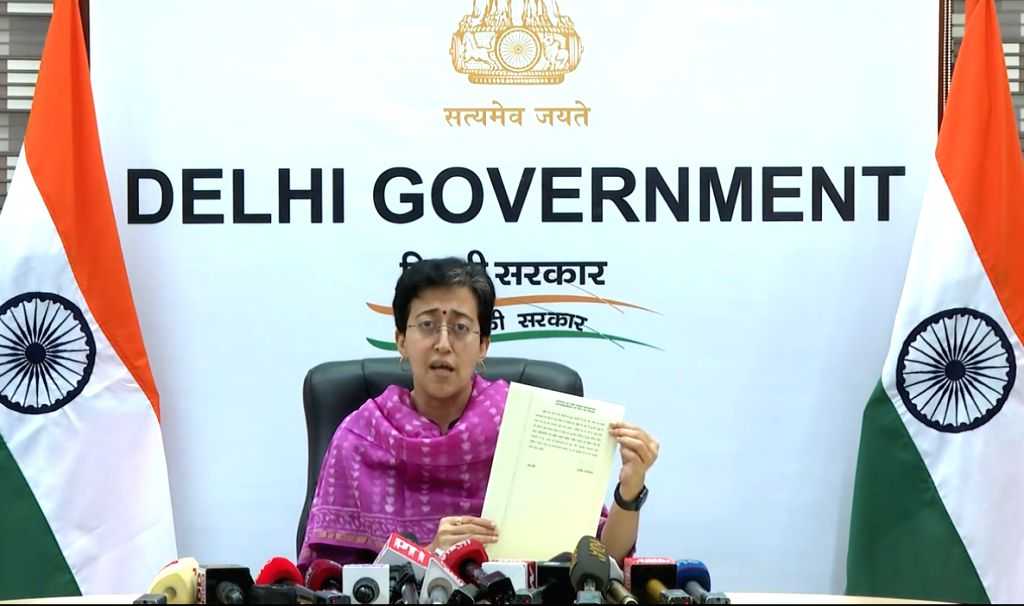Image Source: Prokerala
Arvind Kejriwal’s note to Atishi, despite his incarceration, demonstrated unwavering commitment to public service by issuing a directive from his temporary confines within the Enforcement Directorate lock-up. In a remarkable display of leadership, Mr. Kejriwal, through a written note dispatched to Delhi Water Minister Atishi, addressed the pressing issue of water scarcity plaguing certain areas of the national capital as the impending summer intensifies.
Emphasizing continuity in governance, the Aam Aadmi Party (AAP) asserted its stance that Mr. Kejriwal’s confinement would not disrupt administrative functions, affirming his role as Chief Minister even while in jail. The order, conveyed with urgency, underscored the imperative for the Water Department to deploy tankers promptly to bolster water supply to affected locales, mitigating the hardships anticipated during the scorching summer months.
Despite his personal predicament, Mr. Kejriwal’s directive mirrored his steadfast dedication to public welfare, urging swift action to alleviate the plight of residents grappling with water and sewer-related challenges. His message, relayed through his spouse, Sunita Kejriwal, resonated with a resolute resolve to uphold promises made to the electorate, transcending the confines of his current circumstances.
Furthermore, Mr. Kejriwal’s poignant reflection on the broader societal landscape, wherein he implored against fostering animosity towards any faction, including those in political opposition, exemplified his statesmanship and commitment to fostering unity amidst diversity. His acknowledgment of external and internal forces seeking to undermine the nation’s fabric served as a sobering reminder of the challenges confronting contemporary India.
In expressing optimism regarding his eventual liberation, Mr. Kejriwal exuded confidence in overcoming the legal hurdles he faces, buoyed by the enduring support of his constituents. His assurance of returning to fulfill his pledges encapsulated a spirit of resilience and determination, resonating with supporters and detractors alike.
As Delhi braces for the trials of an arduous summer, Mr. Kejriwal’s directive from confinement serves as a source of strength to his followers across the country.
Table of Contents
Atishi’s press conference faces sharp criticism from BJP
In a recent development in the political landscape of Delhi, the Bharatiya Janata Party’s (BJP) Manoj Tiwari launched a scathing attack on Arvind Kejriwal and the Aam Aadmi Party (AAP), accusing them of attempting to govern the state from behind bars. Tiwari’s remarks come in response to Kejriwal’s assertion that his duties as the Chief Minister of Delhi would not be affected despite being remanded to Enforcement Directorate (ED) custody until March 28.
Tiwari’s pointed critique questioned the legitimacy of governance under such circumstances, likening the situation to a “gang” operating from prison rather than a duly elected government. He raised concerns about the efficacy and integrity of decision-making processes when the head of the government is entangled in legal proceedings, suggesting that it raises questions about the very essence of governance.
Moreover, Tiwari’s remarks highlight the broader implications of Kejriwal’s detention on the functioning of the Delhi government and the potential challenges it may face in carrying out its responsibilities effectively. The BJP leader’s rhetoric underscores the gravity of the situation, portraying it as a crisis of governance that threatens to undermine the democratic principles upon which the system is built.
Similarly, BJP’s national secretary Manjinder Singh Sirsa also weighed in on the matter, denouncing AAP’s response as nothing more than a theatrical performance or “nautanki.” Sirsa’s characterization of the press briefing led by AAP’s Atishi as a sham underscores the deepening political divide and the increasingly acrimonious nature of political discourse in the region.
Accusing Atishi of perpetrating a fraud on the people of Delhi by allegedly presenting a forged letter during the press conference, Sirsa’s remarks add fuel to the already simmering tensions between the two rival political factions. The allegation of forgery not only casts doubt on the integrity of AAP’s leadership but also raises concerns about the veracity of their claims and actions.
Sirsa’s call for an inquiry by Delhi’s Lieutenant Governor, Vinai Kumar Saxena further underscores the seriousness of the allegations and the need for a transparent investigation to ascertain the truth. The insinuation of a potential criminal conspiracy involving the misuse of the Chief Minister’s office amplifies the gravity of the situation, adding layers of complexity to an already convoluted political landscape.
In conclusion, the verbal sparring between the BJP’s Manoj Tiwari and national secretary Manjinder Singh Sirsa against AAP and its leadership reflects the heightened tensions and deep-seated animosities that characterize the political milieu in Delhi. The allegations and counter-allegations levied by both sides underscore the need for greater transparency, accountability, and adherence to democratic norms to restore public trust and confidence in the political process.

1 Comment
Pingback: Political Storm in Delhi: AAP's calls for 'Gherao' Protest